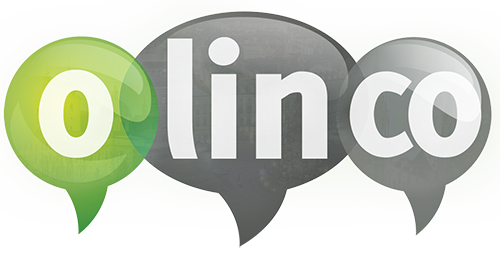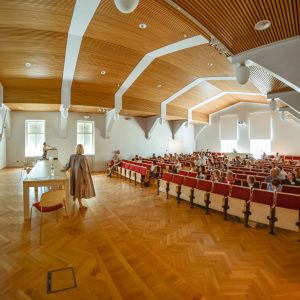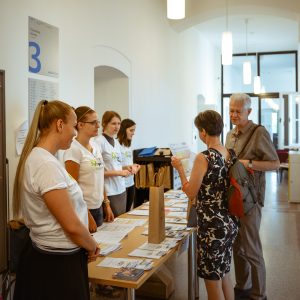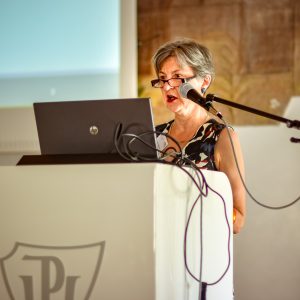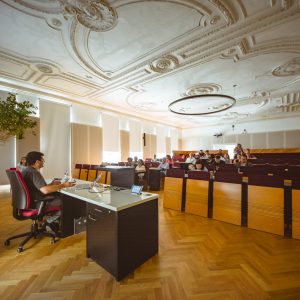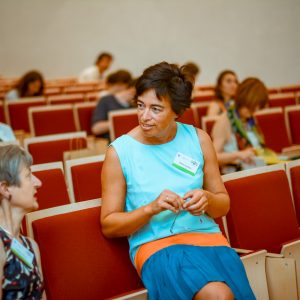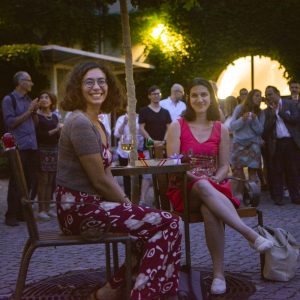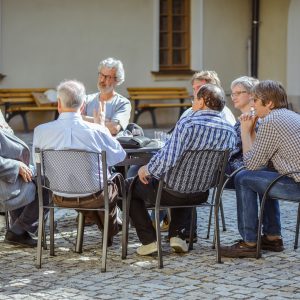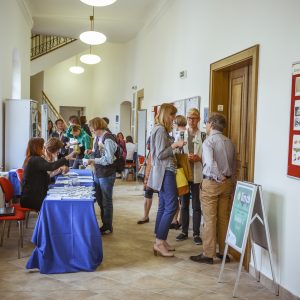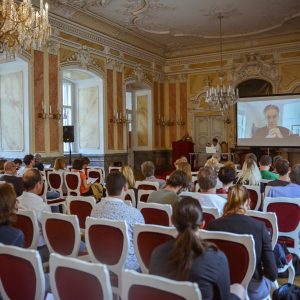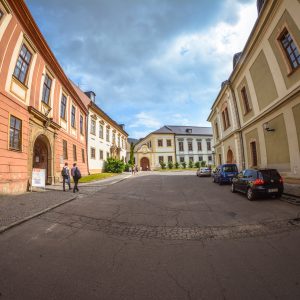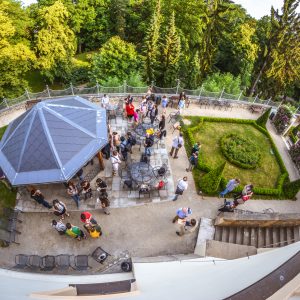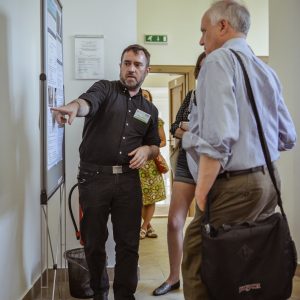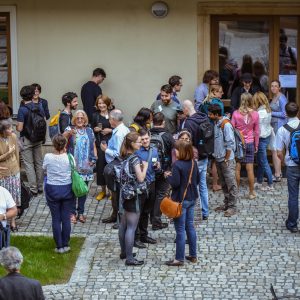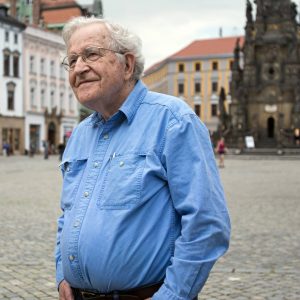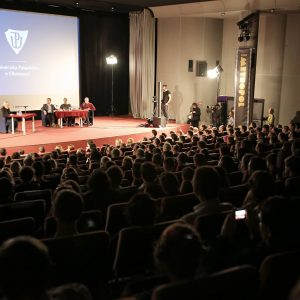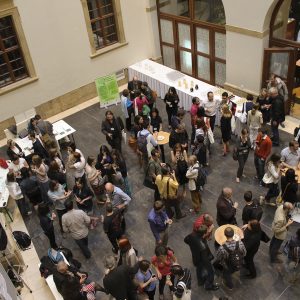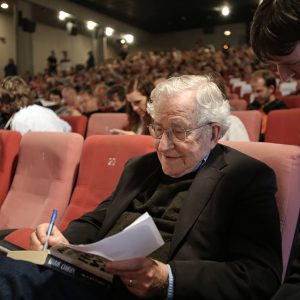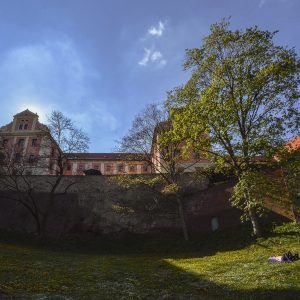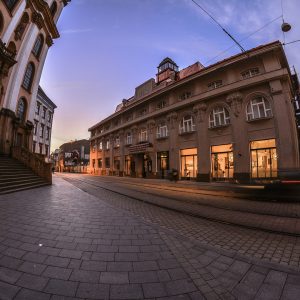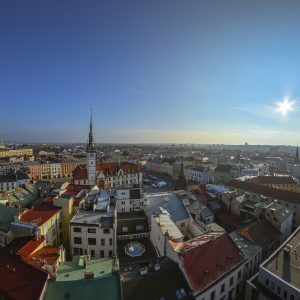The Olomouc Linguistics Colloquium (Olinco) is a general linguistics conference held biannually at Palacký University Olomouc, Czech Republic. It covers synchronic or diachronic aspects of grammar, phonology, semantics, and pragmatics, among others. Papers may also treat language description, language acquisition, performance, translation, or language deficits.
The general topic of the conference is language use and linguistic structure. The contributions are expected to include justified proposals for linguistic structure, and at the same time relate these structures to some aspect of language use, such as information structure, phonetics, or meaning. The conference also includes several specialized thematic sessions.
Invited speakers
Artemis Alexiadou
(Leibniz-Zentrums Allgemeine Sprachwissenschaft
& Humboldt-Universität zu Berlin)
The syntax of nominalization revisited
Abstract: In this talk, I will discuss two issues within syntactic approaches to nominalization, focusing on Grimshaw’s (1990) complex event nominals (CENs), that are currently controversially discussed. The first one concerns the question of whether the derivation of CENs is phrasal as opposed to involving complex head formation. The second one concerns the question of whether CENs may have the same transitive structure found in the verbal domain as opposed to being intransitive. Approaching these issues will shed light on the nature of nominalization process itself, the operations that may create complex objects in the syntax more generally and the cross-linguistic variation found in this domain.
Alberto Hijazo-Gascón
(Universidad de Zaragoza)
Motion events and conceptual transfer in a second language
Abstract: Motion is a crucial conceptual domain. We all describe how we and other entities move, but languages may differ in how they encode semantic components in motion events. According to Talmy’s (1991) semantic typology, verb-framed languages, e.g. Spanish, tend to encode the semantic component of Path (including the direction and trajectory of the movement) in the main verb of the event: Sale corriendo ‘s/he exits running’. Satellite-framed languages, however, tend to encode Path out of the main verb, in a so-called “satellite”: She runs out, with a more frequent inclusion of the Manner component in the main verb. Slobin (1996) shows how these typological differences impact other areas, such as discourse, and the speakers’ rhetorical style. Motion has been identified as one of the areas that are very likely to be a source of conceptual transfer in the acquisition of a new language (Jarvis and Pavlenko 2008). Some aspects of motion seem particularly challenging for learners, even for advanced students (Cadierno 2017). For example, in Spanish as a second language, the use of deictic verbs (venir ‘come’ and traer ‘bring’) or caused motion events (meter ‘put in’, dejar ‘put on’, etc.) (Hijazo-Gascón 2021). Previous studies show how explicit instruction of the semantic contrasts between the students’ L1 and L2 are beneficial to the acquisition of the target language and prevent negative transfer. Working with these contrasts through mediation activities can be particularly interesting, as they would also foster the development of students’ plurilingual competence.
Andrea Pešková
(Freie Universität Berlin)
Intonation acquisition in L2: Patterns, insights, and challenges
Abstract: There is a certain paradox in the acquisition of intonation in a second language (L2): while some scholars claim that intonation is very difficult, if not impossible, for L2 adult speakers to acquire, anecdotal evidence suggests that it is a feature of language we can pick up rapidly when learning a new language or dialect. This apparent contradiction raises the question of which features of L2 intonation are learned and which are not, and why this is the case. In this talk, I will explore the patterns of intonation in L2 prosody, highlighting both the insights gained from recent research and the challenges encountered by learners. Through empirical data collected from learners of various Romance languages (L2), I will show how L1 influences prosodic features in L2, affecting learners’ ability to produce intonation accurately. The findings will shed light on the implications for language instruction and offer strategies to enhance teaching methodologies. Additionally, I will discuss future research directions in understanding L2 intonation, aiming to connect theoretical insights with practical applications in language learning.
Important dates and info
Abstract submission deadline: 31 January 2025 extended to 5 February, 2025
Notification of acceptance: 10 March 2025
Registration and revised abstract submission deadline: 5 May 2025
Conference: 5 – 7 June, 2025
Papers and posters
We welcome proposals for full oral presentations and short presentations (posters) in the form of abstracts related to the general topic and/or a workshop topic. Abstract submission guidelines are given below. The language of the conference is English. All abstract submissions will be anonymously reviewed by an international committee of linguists.
Participants are allowed to present only one single-authored paper. In addition, they may also have joint papers (but not as the first author, and the paper must be presented by another author). All papers will be presented on-site.
Thematic sessions
Details below.
– Motion event construal within and across languages (Friday 6 June 2025)
Convenors: Michaela Martinková (Palacký University Olomouc),
Alberto Hijazo-Gascón (University of Zaragoza),
Rosalía Calle Bocanegra (Palacký University Olomouc)
– First and second language speech learning: Tackling prosody (Friday 6 June + Saturday 7 June 2025)
Convenors: Šárka Šimáčková (Palacký University Olomouc)
Václav Jonáš Podlipský (Palacký University Olomouc)
Andrea Pešková (Free University of Berlin)
– Empirical methods in syntactic theory and analysis (Thursday 5 June 2025)
Convenors: Radek Šimík (Charles University in Prague)
I. PROPOSALS: Abstracts of oral presentations and posters (short presentations) need to comply with the following guidelines:
Anonymity. Abstracts must be anonymous. References to one’s own work should be made in the third person. (Please make sure that you do not include your name in the document properties.)
Length. The text of the abstract should contain between 400 and 500 words (one page maximum). Bibliography and tables or figures may be submitted on a second page.
Structure. It is important that the abstracts clearly state research questions, approach, method, data, and (expected) results.
Acceptable file format. The abstract should be submitted as a PDF file. Please make sure that all fonts are embedded in the file. If your abstract is accepted, you will be asked to supply a revised version for inclusion in a book of abstracts (for the templates, see below).
Multiple authorship. Please note that participants are allowed to present only one single-authored paper. In addition, they may also have joint papers (but not as the first author).
Session selection. During the submission process, you will be asked to indicate whether you want your proposal to be included in one of the thematic sessions or in the main conference session.
Submission. Abstract are submitted via EasyChair. Deadline: see above.
II. REVISED abstracts (following notification of acceptance)
Format of the REVISED abstract. Please use the prepared template (.docx) for the revised abstract, or follow the instructions in the pdf file:
Olinco revised abstract template (.docx) (MS Word)
Olinco revised abstract template (.pdf)
The revised abstract must be written in Times New Roman 11 point font, with 2.5 cm margins on all sides, 1.15 spacing. The revised abstract must include the authors’ names, affiliations, and email addresses in the heading, which is in Times New Roman 12 (see the template above for details). Do not insert page numbers.
Length of the revised abstract. The text of the revised abstract should be two pages long maximum (including references and figures).
Acceptable file format of the revised abstract. The revised abstract should be submitted as a PDF file . Please make sure that all fonts are embedded in the file.
To be submitted by 5 May 2025 via the submission link in Easychair.
Organizing committee
Current members of the Olinco organizing committee at Palacký University Olomouc:
Michaela Čakányová
Joseph Emonds
Markéta Janebová
Michaela Martinková
Václav Jonáš Podlipský
Šárka Šimáčková
Ludmila Veselovská
Board of reviewers
The organizing board is very grateful to all distinguished colleagues who contribute to the conference by reviewing submitted abstracts.
Their full list is here (.pdf)
Registration deadline: 5 May 2025. After this date, registration will be closed for presenters. If you are interested in attending as a member of audience, please contact the organisers at olinco@upol.cz. (Palacký University students and employees can attend the conference free of charge without previous registration – please register onsite at the registration desk).
Fees (card payment only):
- €170 (including conference dinner, welcome and good-bye drinks and coffee breaks)
- €140 (including welcome and good-bye drinks and coffee breaks)
- discount for Palacký University participants (before you register, please get in touch with kamila.vecerova@upol.cz)
– Motion event construal within and across languages
Detailed description (pdf)
Convenors: Michaela Martinková (Palacký University Olomouc), Alberto Hijazo-Gascón (University of Zaragoza), Rosalía Calle Bocanegra (Palacký University Olomouc)
– First and second language speech learning: Tackling prosody
The central theme of this thematic session is second language prosody. We especially invite contributions reporting on linguistic aspects of bi-/multilingual/L2 prosody, including both word-level prosody (stress, lexical tone) and sentence-level prosody (intonational prosody, timing phenomena such as rhythm, pausing, and fluency). Our aim is to incorporate a range of topics and perspectives: phonological and phonetic perspectives on L2 prosody, experimental studies as well as theoretical modelling of L2 prosody, studies of production and/or perception of L2 prosody, reports on interfaces with other aspects of language (e.g. syntax, semantics, pragmatics), methodological papers (e.g. description of phonetic learner corpora with prosodic annotation).
However, we also encourage abstract submissions related to other linguistic aspects of speech and speech-sound learning: research in phonetics and phonology, phenomena of speech perception and production, cross-language influences, long-term and immediate effects of the environment on speech production, perception and/or representation, etc. We welcome reports on work in progress.
Convenors: Šárka Šimáčková (Palacký University Olomouc), Václav Jonáš Podlipský (Palacký University Olomouc), Andrea Pešková (Free University of Berlin)
– Empirical methods in syntactic theory and analysis
Detailed description (pdf)
Convenor: Radek Šimík (Charles University in Prague)
The conference programme is available here (updated 3 June 2025). The book of abstracts is available here.
Oral presentations (on-site only)
Each paper in an oral session will be allotted 40 minutes, including 5 – 10 minutes for discussion, i.e. the talk should last no more than 30 – 35 minutes.
The language of the presentation is English. Non-English examples should be properly glossed and translated to English.
Available technology: We will provide a PC with Microsoft Office and Adobe Reader connected to a dataprojector and speakers. We strongly advise you to bring your presentation on a USB flash drive because we cannot guarantee your laptop will be compatible with our on-site equipment (especially applies to Mac users). Presenters will have 10 minutes before the beginning of every oral session to check their presentations on the equipment. A technical assistant will be present to help.
Poster presentations (on-site only)
The language of the presentation is English. Non-English examples should be properly glossed and translated to English.
Posting: Authors of posters are required to be present during their poster session to discuss their posters with interested conference-goers.
Authors should attach their posters to the boards before the beginning of the session (materials for attaching will be provided).
Posters should be removed from the boards by their presenters before the next poster session begins or in the evening following the presentation. Posters left on the boards will be removed by the organizers and can be collected at the registration desk.
Format: The poster boards are in the portrait orientation, their size is ISO A1 format (594 mm width, 841 mm height). The main text should be in a large enough font (e.g. 32 pts). The text should be brief and presented in bullet-point or numbered lists as much as possible. Avoid long paragraphs.
We recommend that poster presenters prepare reduced-size copies of their posters (e.g. A4 sheets) to be handed out.
Conference venue: Palacký University Olomouc, Faculty of Arts, Department of English and American Studies
Address: Křížkovského 10, Olomouc, 771 80
The 2025 Olomouc Linguistics Colloquium (Olinco 2025) will be held in the recently restored Palacký University Faculty of Arts.
This building which served for hundreds of years as a college related to the Moravian archbishopric is centrally located among other historic buildings atop the city walls. It overlooks a verdant park that separates the conference venue and the dormitory accommodations.
Both the conference venue and the accommodations are easily accessible by tram lines. Visit practical information for more.
Travel
Coming by air: The closest airports are in Ostrava (2 hours by bus and train), Brno (2 hours), Prague (3.5 hours), Bratislava (4 hours), Katowice (4 hours) and Vienna (4.5 hours).
From Prague airport to Prague main train station: The easiest way to get from Václav Havel Airport Prague to the main train station (Praha, hlavní nádraží, sometimes abbreviated to Praha, hl. n.) is to take the Airport Express (AE) bus. It stops right in front of the arrival hall (a bit to the right, the last bus stop) and takes you directly to the main train station, which is the terminus. When travelling from the airport, the Airport Express bus tickets may be purchased in the Visitor Centre at Arrival Hall or directly from the driver. You buy the ticket from the driver for CZK 60 (about EUR 2.5, but the driver does not accept foreign currencies, so you have to exchange money at the airport, try to have a 200 crown note or less). The ticket machines at the stop do not sell this ticket. More info here.
Alternatively, take bus 119 and then change for the metro (you can get the CZK 40 ticket from the ticket machine or pay by card in the bus).
Coming by train: Olomouc is easily reached by express trains (2.5 hours from Prague, 3.5 hours form Vienna, 3 hours from Katowice). Online connection search. Online map of train delays (in Czech).
There are three major railway companies (Czech Railways, RegioJet, and Leo Express). With RegioJet and Leo Express, you book a specific connection, and the ticket cannot be used for any other train. With Czech Railways, you can book a specific train or an open ticket (only usable on that day for a Czech Railways train).
General information about Olomouc including details on public transportation.
Palacký University Olomouc, Faculty of Arts
Address: Křížkovského 12, Olomouc, 771 80
Web: http://www.ff.upol.cz/en/
Lunch break tips:
Restaurants close to the venue & other tips
Accommodation:
Palacký University dormitories
Tips on accommodation in the vicinity of the conference venue (all of these are included at Booking.com):
Hotel U Dómu (300 meters to venue)
Address: Dómská 4, Olomouc 77200
Tel.: +420 724 335 609
E-mail: hoteludomu@seznam.cz
Miss Sophie’s Hotel (350 meters to venue)
Address: Denisova 292/33
Tel.:+ 420 587 203 509
Email: olomouc@miss-sophies.com
Long Story Short (350 meters to venue)
Address: Koželužská 945/31
Tel.: +420 588 008 278, +420 606 090 469
Email: reception@longstoryshort.cz
Hotel Palác (400 meters to venue)
Address: 1. Máje 869/27
Tel.: +420 585 242 175
Email: info@hotelpalac.cz
OREA Hotel Arigone (450 meters to venue)
Address: Univerzitní 20, 779 00
Tel.: +420 585 232 351
Email: recepce.arigone@orea.cz
Hotel V Ráji (500 meters to venue)
Address: Hanáckého pluku 10, Olomouc, 779 00
Tel.: +420 739 052 417
Hotel Pension Na Hradě (700 meters to venue)
Address: Michalská 4, Olomouc, 779 00
Tel.: +420 585 203 231
Fax: +420 585 203 232
Email: penzion@penzionnahrade.cz
Penzion Na Hradbách (800 meters to venue)
Address: Hrnčířská 3, Olomouc 772 00
Tel.: +420 585 233 243, +420 602 755 848
E-mail: rezervace@nhpension.eu
Hotel Trinity (900 meters to venue)
Address: Pavelčákova 22
Tel.: +420 581 830 811
Email: reception@hotel-trinity.cz
Pension Křivá (1100 meters to venue)
Address: Křivá 8, Olomouc, 772 00
Tel.: +420 585 209 204
E-mail: info@pension-kriva.cz
Money
The Czech koruna (CZK or Kč) is the official currency in the Czech Republic. The approximate exchange rate is ca 25.15 CZK to a Euro and 25.8 CZK to a US Dollar. Exchange rates for all major currencies are available here.
Electricity
Czech sockets are standard European sockets CEE 7/5, with a voltage of 230 V/50Hz. All visitors coming from countries using appliances/plugs that do not work with such sockets/voltages (e.g. USA, UK) are advised to bring adapters.
Mobile phones
Czech mobile phone operators use both of the two standard European GSM bands, 1800 and 900 MHz. All European mobile phones will work without problems but visitors from the US may need a tri-band phone. The country calling code for the Czech Republic is +420.
Weather
Czech Republic has a temperate continental climate, with temperatures averaging 17°C during the day in early June. Worst comes to worst, a raincoat or an umbrella may be of some use. Current forecast is available here.
Publication: in case of interest, we will consider publishing the contributions from the thematic sessions in the form of a collective monograph or a special issue.
Olomouc Linguistics Colloquium proceedings (previous volumes):
Olinco 2023: Selected papers were included in a peer-reviewed volume of conference proceedings (available here).
Olinco 2021: Selected papers presented at the Olomouc Linguistics Colloquium 2021 were included in a peer-reviewed volume of conference proceedings entitled Language Use and Linguistic Structure. Proceedings of the Olomouc Linguistics Colloquium 2021.
Olinco 2018: Selected papers that were presented at the Olomouc Linguistics Colloquium 2018 have been included in a peer-reviewed volume entitled Proceedings of the Olomouc Linguistics Colloquium 2018 (included in the Web of Science™).
Olinco 2016: The book of Proceedings of the Olomouc Linguistics Colloquium 2016 is available here (.pdf).
Olinco 2014: The electronic version of the Olinco 2014 proceedings, entitled Complex Visibles Out There, can be downloaded here (.pdf). The volume is a part of the Olomouc Modern Language Series.
Olinco 2013: Selected papers presented at the Olomouc Linguistics Colloquium 2013 are included in the proceedings entitled Language Use and Linguistic Structure (.pdf) and in a separate themed monograph entitled Nominal Structures: All in Complex DPs (.pdf). Both books have been included in the Web of Science™.
If you have any questions, do not hesitate to contact us at olinco@upol.cz.
Previous Olinco conferences:
Olinco 2013:
Book of abstracts (.pdf)
Conference proceedings (.pdf)
Monograph (.pdf)
Olinco 2014:
Book of abstracts (.pdf)
Conference proceedings (.pdf)
Olinco 2016:
Conference proceedings
photo gallery
Olinco 2018:
Book of Abstracts
Proceedings
Conference website
Olinco 2023:
Book of abstracts (.pdf)
Conference programme (.pdf)
Conference proceedings (.pdf)
